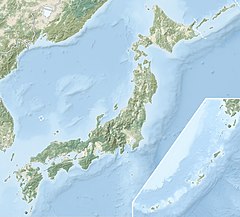Tatsuno Domain (龍野藩, Tatsuno-han) was a feudal domain under the Tokugawa shogunate of Edo period Japan, in Harima Province in what is now the southwestern portion of modern-day Hyōgo Prefecture. It was centered around Tatsuno Castle which was located in what is now the city of Tatsuno, Hyōgo. It was controlled by a cadet branch fudai daimyō Niwa clan throughout its history.[1][2][3]
| Tatsuno Domain 龍野藩 | |
|---|---|
| under Tokugawa shogunate Japan | |
| 1617–1871 | |
| Capital | Tatsuno Castle |
| Area | |
| • Coordinates | 34°52′7.67″N 134°32′41.4″E / 34.8687972°N 134.544833°E |
| • Type | Daimyō |
| Historical era | Edo period |
• Established | 1617 |
• Honda clan | 1617 |
• Ogasawara clan | 1626 |
• Okabe clan | 1633 |
• Kyōgoku clan | 1637 |
• Wakisaka | 1672 |
• Disestablished | 1871 |
| Today part of | part of Hyōgo Prefecture |


History
editAt the start of the Edo period, the area around Tatsuno was part of the vast holdings of the Ikeda clan of Himeji Domain. In 1617, Ikeda Mitsumasa was transferred to Tottori Domain and his former estates were divided. A son-in-law of Tokugawa Ieyasu, Honda Tadamasa received a 150,000 koku portion centered on Himeji Castle. Tadamasa's younger son, Honda Masatomo, was transferred from Ōtaki Domain in Kazusa Province and given a 50,000 koku domain at Tatsuno. He reconstructed Tatsuno Castle and its castle town. On the death of his brother Honda Tadatoki of Himeji Domain in 1626, he was transferred to Himeji, and replaced at Tatsuno by his cousin, Ogasawara Nagatsugu, who also received an additional 10,000 koku to take care of Senhime, the widow of Honda Tadaoki and daughter of Tokugawa Ieyasu. After brief periods under the Okabe clan and Kyōgoku clan, the domain was assigned to the Wakisaka Yasumasa, formerly of Iida Domain in Shinano Province. The Wakisaka would continue to rule the domain until the Meiji Restoration. Wakizaka Yasumasa received permission from the shogunate to rebuild Tatsuno Castle. The 8th daimyo, Wakasaka Yasutada had a very long tenure, and served as Jisha-bugyō and rōjū in the shogunal administration. A very capable ruler, he reformed the domain's finances and also established a han school. The domain developed soy sauce as a major cash commodity. His successor, Wakisaka Yasunori, served as Kyoto Shoshidai, and also as rōjū. During the Bakumatsu period, the domain was initially a strong supporter of the shogunate. However, under WakisakaYasuaya, the domain forces stopped at the border of Ako district, and refused to proceed further during th Second Chōshū expedition. By the start of the Boshin War, the domain had changed fealty to the new Meiji government and fought against the shogunate in Echigo Province and other locations. In 1871, with the abolition of the han system, the domain became "Tatsuno Prefecture", which was merged with "Shikama Prefecture", which in turn became part of Hyōgo Prefecture.
The Wakisaka clan was ennobled with the kazoku peerage title of shishaku (viscount) in 1884.
Holdings at the end of the Edo period
editAs with most domains in the han system, Tatsuno Domain consisted of several discontinuous territories calculated to provide the assigned kokudaka, based on periodic cadastral surveys and projected agricultural yields.[4][5]
- Harima Province
- 4 villages in Shikisai District
- 68 villages in Ittō District
- 62 villages in Issai District
- Mimasaka Province
- 11 villages in Aida District
- 5 villages in Mashima District
List of daimyō
edit# Name Tenure Courtesy title Court Rank kokudaka Honda clan, 1617-1626 (Fudai) 1 Honda Masatomo (本多政朝) 1617 - 1626 Kai-no-kami (甲斐守) Junior 5th Rank, Lower Grade (従五位下) 50,000 koku Ogasawara clan, 1626-1632 (Fudai) 1 Ogasawara Nagatsugu (小笠原長次) 1626 - 1632 Shinano-no-kami (信濃守) Junior 5th Rank, Lower Grade (従五位下) 60,000 koku tenryō 1632-1633 Okabe clan, 1633-1635 (Fudai) 1 Okabe Nobukatsu (岡部宣勝) 1633 - 1635 Shinano-no-kami (美濃守) Junior 5th Rank, Lower Grade (従五位下) 53,000 koku tenryō 1635-1637 Kyōgoku clan, 1637-1658 (Tozama) 1 Kyōgoku Takakazu (京極高和) 1637 - 1658 Gyobu-taiyu (刑部大輔) Junior 5th Rank, Lower Grade (従五位下) 60,000 koku tenryō 1658-1672 Wakisaka clan, 1672-1871 (Tozama -> Fudai) 1 Wakisaka Yasumasa (脇坂安政) 1672 - 1684 Nakatsukasa-shoyu (中務少輔) Junior 5th Rank, Lower Grade (従五位下) 53,000 koku 2 Wakisaka Yasuteru (脇坂安照) 1684 - 1709 Awaji-no-kami (淡路守) Junior 5th Rank, Lower Grade (従五位下) 53,000 -> 51,000 koku 3 Wakisaka Yasuzumi (脇坂安清) 1709 - 1722 Awaji-no-kami (淡路守) Junior 5th Rank, Lower Grade (従五位下) 51,000 koku 4 Wakisaka Yasuoki (脇坂安興) 1722 - 1747 Nakatsukasa-shoyu (中務少輔); Awaji-no-kami (淡路守) Junior 5th Rank, Lower Grade (従五位下) 51,000 koku 5 WakisakaYasuhiro (脇坂安弘) 1747 - 1757 Nakatsukasa-shoyu (中務少輔) Junior 5th Rank, Lower Grade (従五位下) 51,000 koku 6 Wakisaka Yasuzane (脇坂安実) 1757 - 1759 Ise-no-kami (伊勢守) Junior 5th Rank, Lower Grade (従五位下) 51,000 koku 7 Wakisaka Yasuchika (脇坂安親) 1759 - 1784 Awaji-no-kami (淡路守); Zusho-no-kami (図書頭) Junior 5th Rank, Lower Grade (従五位下) 51,000 koku 8 Wakisaka Yasutada (脇坂安董) 1784 - 1841 Nakatsukasa-daiyu (中務大輔); Jijū (侍従) Junior 4th Rank, Lower Grade (従四位下) 51,000 koku 9 Wakisaka Yasuori (脇坂安宅) 1841 - 1862 Nakatsukasa-daiyu (中務大輔); Jijū (侍従) Junior 4th Rank, Lower Grade (従四位下) 51,000 koku 10 Wasizaka Yasuaya (脇坂安斐) 1862 - 1871 Awaji-no-kami (淡路守) Junior 5th Rank, Lower Grade (従五位下) 51,000 koku
See also
editFurther reading
edit- Bolitho, Harold. (1974). Treasures Among Men: The Fudai Daimyo in Tokugawa Japan. New Haven: Yale University Press. ISBN 978-0-300-01655-0; OCLC 185685588
References
edit- ^ Nakayama, Yoshiaki (2015). 江戸三百藩大全 全藩藩主変遷表付. Kosaido Publishing. ISBN 978-4331802946.(in Japanese)
- ^ Nigi, Kenichi (2004). 藩と城下町の事典―国別. Tokyodo Printing. ISBN 978-4490106510.
- ^ Papinot, E (1910). Historical and Geographic Dictionary of Japan. Tuttle (reprint) 1972.
- ^ Mass, Jeffrey P. and William B. Hauser. (1987). The Bakufu in Japanese History, p. 150.
- ^ Elison, George and Bardwell L. Smith (1987). Warlords, Artists, & Commoners: Japan in the Sixteenth Century, p. 18.

